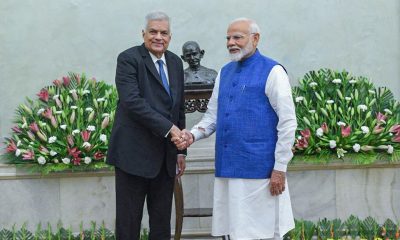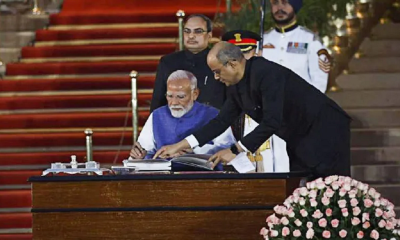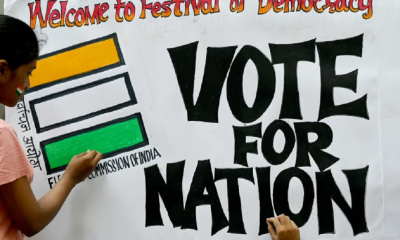Latest News
India set to approve historic women’s quota bill
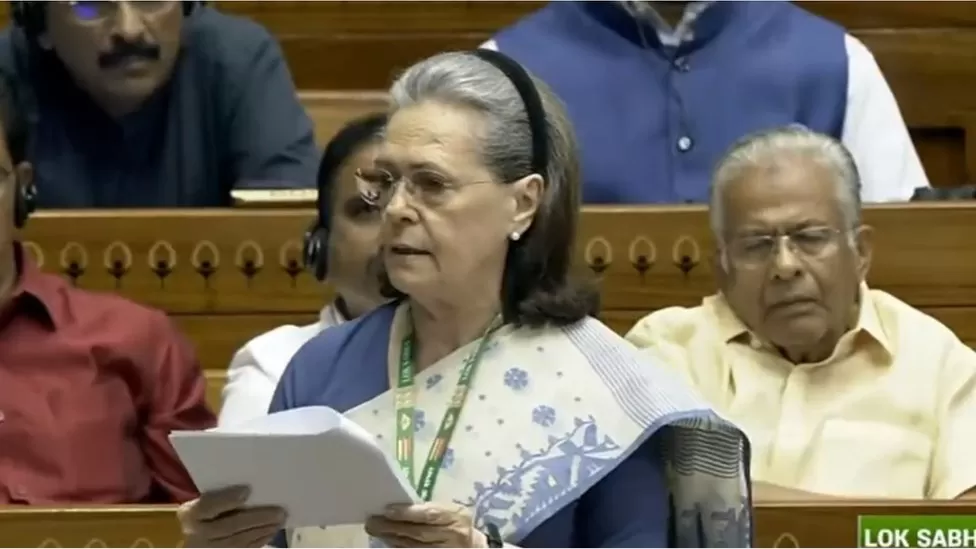
The lower house of the Indian parliament has passed a bill guaranteeing a third of seats for women in the parliament and state assemblies.
First proposed in 1996, the bill had been pending for decades amid opposition from some political parties.
On Wednesday, the Lok Sabha passed it with near unanimity after hours of fierce debate. The bill will now require the approval of lawmakers in Rajya Sabha, the upper house of the Indian parliament. If passed here, it will be sent to the Indian president for approval and become law.
But it is still some way from being implemented as that would depend on the completion of India’s census. The exercise, conducted every 10 years, was set to be held in 2021 but was delayed by the coronavirus pandemic and is now expected to take place in 2025. Reported plans to redraw boundaries of assembly seats to increase the overall number of constituencies, known as delimitation, could further complicate the bill’s implementation.
The passing of the bill is expected to boost the fortunes of the governing Bharatiya Janata Party (BJP) in the general elections next year.
On Wednesday, Prime Minister Narendra Modi thanked MPs who voted for the bill in Lok Sabha. He called it a “historic legislation” that will enable greater participation of women in the political process. The bill was passed after 454 MPs from across party lines voted in its favour with only two against it.
The Lok Sabha debated the legislation for nearly eight hours, with several members of the Opposition raising concerns about its implementation even as they voiced their support. Former Congress president Sonia Gandhi said the party supported the proposed legislation but demanded its immediate implementation. “How many years will they have to wait, two, four, eight?” Ms Gandhi asked. “Delaying this would be doing gross injustice to women.”
Several opposition MPs have also demanded a separate quota for women belonging to Other Backward Classes (OBCs). Hinduism’s caste system puts Brahmins or priests at the top, and Dalits (formerly untouchables) and Adivasis (tribespeople) at the bottom. In between are a multitude of lower and intermediate castes, which are roughly believed to constitute about 52% of the population, and are recognised as Other Backward Classes or OBCs. While India’s census has always recorded the population of Dalits and Adivasis, it has never counted the OBCs.
The proposed bill provides for one-third of the seats, which are already reserved for Dalits and tribespeople, to be reserved for women. But it excludes a similar sub-quota for women who belong to OBCs.
Speaking in parliament on Wednesday, Ms Gandhi said the government should conduct a caste census – or a count of OBCs – and extend the benefits of the proposed law to women from those groups as well. Some other opposition MPs called the move an eyewash by the ruling party.
MP Asaduddin Owaisi, one of the two votes against the bill, said the current bill would only benefit upper caste women.
(BBC)
Latest News
Curran, bowlers lead Desert Vipers to maiden ILT20 title

After two heartbreaks, it was third time lucky for Desert Vipers as they broke the final hoodoo, defeating MI Emirates by 46 runs to claim their maiden ILT20 title in Dubai.
The win was headlined by captain Sam Curran, who held the Vipers innings together with an unbeaten 74 off 51 balls. He was helped by Max Holden (41 off 32) and Dan Lawrence (23 off 15) as Vipers notched up an impressive 182 for 4 in their 20 overs.
MIE never got their chase going, losing wickets at regular intervals. Naseem Shah was at his fiery best, picking up 3 for 18 in his four overs, while Usman Tariq curbed the runs in the middle overs, returning 2 for 20. David Payne also picked up 3 for 42, all three of his wickets coming in an over, as MIE were bowled out for 136 in 18.3 overs. It was fitting that the most consistent team of the season took home the title.
Vipers’ win means that ILT20 has now had a different winner in each of the first four seasons – Gulf Giants, MIE, Dubai Capitals and now Vipers.
Fakhar Zaman didn’t take time to go after Shakib Al Hasan, depositing him over wide long-on second ball of the innings. MIE were sloppy with their fielding, and both Fakhar and Jason Roy cashed in. After Fakhar collected a boundary off first ball off AM Ghazanfar, Roy hit left-arm quick Muhammad Rohid for back-to-back fours as Vipers raced to 34 for 0 after three overs. But Fazalhaq Farooqi helped MIE hit back with a double-wicket opening over.
Roy first flat-batted a short-of-a-length delivery straight to short midwicket before Farooqi cleaned up Fakhar with a peach of an inducker that pitched just outside off and swung back in breaching the opener’s defenses. Curran took five balls to get off the mark but closed out the powerplay in style with three straight fours off Farooqi as Vipers reached 59 for 2 in six overs.
While Holden took his time to settle, Curran kept the scorecard ticking. He pulled offspinner Tajinder Singh twice through midwicket before guiding Kieron Pollard past short third. Holden, going just about a run-a-ball, found his groove as well as he took Tajinder inside out over covers and then planted him over long-on as Vipers raced past 100 in the 12th over.
Mystery spinner Arab Gul broke the 89-run third-wicket stand by accounting for Holden but Lawrence ensured the momentum wasn’t lost. He smoked Gul over covers second ball before Curran reached his fifty off 39 balls as Vipers eyed a late push. That came via a 21-run 18th over with Curran and Lawrence sending Romario Shepherd over the fence three times. Vipers collected 46 runs off the last four overs to breach the 180-mark.
Muhammad Waseem, MIE’s star of the ILT20, started the chase briskly. He clubbed Payne over deep midwicket, while Andre Fletcher sent fast bowler Khuzaima Tanveer straight down the ground for six. Though Fletcher fell, mistiming Naseem to deep midwicket, Waseem kept going. He pulled Naseem through midwicket and then edged Curran past the wicketkeeper. But a flurry of wickets dented MIE’s chase.
Naseem struck for the second time when his pacy indipper had Tom Banton’s bat turning in his hand for a simple catch to Curran at mid-on for 7. Tanveer then got the prized scalp of his countryman Waseem, who in a bid to steer the ball fine, could only manage a thick edge to the wicketkeeper as MIE stumbled to 46 for 3 in six overs. Tariq then got into the act, sending back Sanjay Krishnamurthi. Having managed just 2 off 8, Krishnamurthi tried to pull Tariq over deep midwicket but could only manage a miscue and Hassan Nawaz completed a stunning diving catch low to his right.
With the required rate touching close to 11, it was down to the two experienced heads Shakib and Pollard to try and conjure some magic. They added 60 off 45 balls, but Vipers maintained their lines, not giving much away on a surface which had something for the bowlers throughout. With the required rate almost 14 at the start of the 16th over, Shakib tried to haul Tariq over long-on but failed to generate enough power with Tanveer doing the rest.
Pollard fell six balls later and with that went MIE’s chances of a second title. Payne picked up three wickets in an over before Tanveer closed the chase, sparking wild celebrations in the Vipers dugout. MIE lost their last six wickets for just 22 runs in 3.3 overs to go down in a heap.
Brief scores:
Desert Vipers 182 for 4 in 20 overs (Fakhar Zaman 20, Janson Roy 11, Sam Curran 74*, Max Holden 41, Dan Lawrence 23; Fazalhaq Farooqi 2-33, Arab Gul 1-14) beat MI Emirates 136 in 18.3 overs (Muhammed Waseem 26, Andre Fletcher 10, Shakib Al Hasan 36, Kieron Pollard 28, Tajinder Singh 12; Naseem Shah 3-18, Davi Payne 3-42, Khuzaima Tanveer 2-22, Usman Tariq 2-20) by 46 runs
(Cricinfo)
Latest News
Bangladesh look to move T20 World Cup matches from India amid Mustafizur row

Bangladesh will ask the ICC to relocate their T20 World Cup matches from India to Sri Lanka, after Kolkata Knight Riders were instructed to release Mustafizur Rahman as a result of deteriorating political ties between Bangladesh and India.
The BCB is expected to write to the ICC to raise their concerns about player safety in Kolkata, where Bangladesh are scheduled to play their first three matches of the World Cup next month.
Following the BCB’s emergency meeting of board directors over Zoom on Saturday, the media committee chairman Amzad Hussain told ESPNcricinfo: “We have three matches of the T20 World Cup in Kolkata, so we will write to the ICC regarding what has happened today.”
Bangladesh’s sports adviser Asif Nazrul said that he has doubts about the team’s safety in India, after the BCCI cited “recent developments” in their explanation for Mustafizur’s removal from the IPL, adding that he will instruct the BCB to write to the ICC about moving their matches to Sri Lanka.
“I have asked the BCB to explain the entire matter to the ICC,” Nazrul wrote on his official Facebook page. “The board should inform that where a Bangladeshi cricketer cannot play in India despite being contracted, the entire Bangladeshi cricket team cannot feel safe going to play in the World Cup. I have also instructed the Board to request that Bangladesh’s World Cup matches be held in Sri Lanka.”
Nazrul added that he has requested the country’s information and broadcasting ministry to stop showing the IPL in Bangladesh.
Following the BCCI’s instructions, KKR confirmed that they have released Mustafizur from their squad for the 2026 IPL. KKR had acquired the left-arm fast bowler’s services for 9.2 crore in the IPL auction last month, though they faced a backlash for their selection in the last few days from Indian spiritual and political leaders.
Interestingly, the BCB had announced their home schedule for 2026 on Friday, including white-ball matches against India, a series that was postponed from 2025.
Bangladesh’s T20 World Cup matches are scheduled to be held in Kolkata and Mumbai, with their opening fixture against West Indies at Eden Gardens on February 7.
[Cricinfo]
Latest News
Root and Brook shine before afternoon gloom ends play early

Little over an hour into the Ashes finale at SCG, another truncated Test appeared to be in motion and looked set to punctuate a whirlwind series that has left a rather hollow feeling for many. But England recovered from 57 for 3 as batting became easier on a surface that offered seam movement with the new ball.
Joe Root and Harry Brook combined for an unbroken 154-run stand – the second highest partnership of the series for either side – to ensure England reached stumps in a decent position after just 45 overs were bowled due to rain and lightning.
The measured batting of Root and Brook combined with Sydney’s annual sketchy weather means, surely, that this match will last considerably longer than the two-day Tests in Perth and Melbourne.
With so much pressure on SCG curator Adam Lewis, having grimly watched his counterpart Matt Page face a public grilling after the Boxing Day Test, he left just 5mm of grass on the pitch – half the length of the maligned furry MCG surface.
Lewis appears set to escape scrutiny, with the spotlight likely to shine on Australia’s selectors after deciding not to select offspinner Todd Murphy. With seam-bowling allrounder Beau Webster replacing quick Jhye Richardson, Australia stepped on the SCG field without a specialist spinner for the first time since 1888.
The ground’s characteristics have changed notably in recent seasons, moving away from its spin-friendly traditions. But by the afternoon, with Root and Brook in complete control, skipper Steven Smith probably wished he could deploy Murphy with Australia’s attack lacking variety.
The trio of frontline quicks each picked up a wicket but allrounder Cameron Green, whose place in the team was under major scrutiny, struggled to hit the right length and finished with 0 for 57 from eight overs.
Brook was mostly circumspect by his standards, but did counter-attack when Green resorted to a short-ball tactic, while Root played in trademark style by scoring heavily behind square on the off side.
England, of course, will have hoped their two lead batters could have mustered such a partnership earlier in the series, but the tourists have started their quest for a second consecutive consolation victory brightly.
Amid sunny and humid morning conditions, a relief with grim weather on the radar, skipper Ben Stokes elected to bat after the coin again fell in his favour. It was perhaps another curious decision given his penchant for bowling first before this tour, which had been the catalyst for England’s victory at the MCG.
His mood would have soured after England’s top-order struggled with the seam movement on a green-tinged surface, losing 3 for 18 by the middle of the first session.
Before the collapse, opener Ben Duckett had feasted on unusually ragged bowling from nemesis Mitchell Starc, who he whacked for five boundaries in less than four overs.
After a hapless series on-field and some embarrassing shenanigans off it, Duckett appeared to be carrying over the momentum from his invaluable second-innings cameo at the MCG. He hit Starc for consecutive boundaries to roll to 27 in 23 balls as he and Zak Crawley appeared on the way towards a blossoming partnership that had never previously reached the eighth over in the series.
But Starc finally found the right length and Duckett could not help himself, tamely prodding to a flying Alex Carey. Having impressed in his Ashes debut at the MCG, Jacob Bethell was once again calm and watchful against occasional rampant seam movement from Scott Boland. 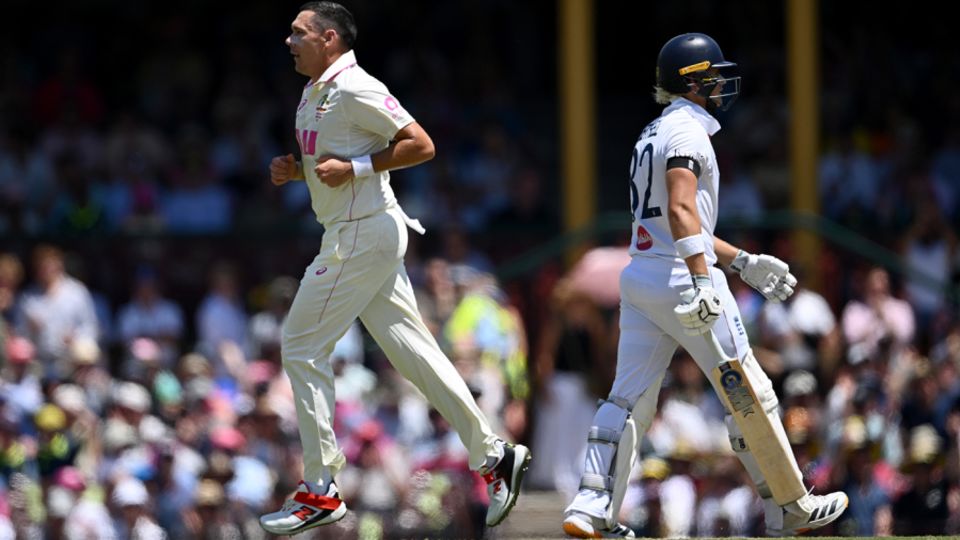
Bethell did not open his account until his 15th ball when he cut Starc through backward point for a boundary, but it was respite amid familiar woe for England’s batters.
After swatting a short ball to the fence, Crawley’s latest teaser ended when he fell lbw to a full delivery from Michael Neser before Bethell nicked off to Boland, who had moved over the wicket.
At this juncture, there were fears of another frantic innings with Cricket Australia’s hierarchy no doubt watching on nervously. But Root and Brook batted sensibly to ensure England stabilised by lunch.
While he removed the monkey on his back after his brilliant ton in Brisbane, Root’s troubles in Australia have mostly remained this series. But this was a golden opportunity to settle in for the long haul despite him almost nicking off on the first delivery.
He nailed his next attempt at his trademark cover drive to get him going, while Brook’s first boundary was unsurprisingly less orthodox after top-edging Boland over the slips.
But Brook was then uncharacteristically restrained in a notable contrast to his madcap 41 in the first-innings at the MCG. Australia’s attack tried to bait him by settling into a length outside off stump but Brook mostly kept his aggressive instincts in check.
He had his eyes set on a belated conversion having made starts in each of his first innings this series and found himself in a nice groove with Root, who after lunch reached 40 for just the second time in the series.
Australia lacked inspiration on a slowing surface and they resorted to a short-ball tactic in the hope that Brook would lose his patience. It almost went to plan when Brook on 45 top-edged Starc into a gap on the leg side before he regrouped to whack Webster for a boundary to bring up a 63-ball half-century.
It followed Root’s half-century off 65 balls as the pair appeared set to bat through the session until the thick clouds started to close in on the ground. Play was halted due to bad light before the weather deteriorated – although it did eventually clear up but stumps was instead called.
England opted against selecting Shoaib Bashir, meaning their first-choice spinner of recent years did not feature in the entire series. Seamer Matthew Potts is making his series debut after replacing Gus Atkinson, who was ruled out with a hamstring injury picked up in the fourth Test.
Brief scores: [Day 1 Stumps]
England 211 for 3 in 45 overs (Harry Brook 78*, Joe Root 72*; Mitchell Starc 1-53, Michael Neser 1-36, Scott Boland 1-48) vs Australia
[Cricinfo]
-

 News2 days ago
News2 days agoHealth Minister sends letter of demand for one billion rupees in damages
-

 Features6 days ago
Features6 days agoIt’s all over for Maxi Rozairo
-

 News5 days ago
News5 days agoLeading the Nation’s Connectivity Recovery Amid Unprecedented Challenges
-

 News11 hours ago
News11 hours agoPrivate airline crew member nabbed with contraband gold
-

 Opinion4 days ago
Opinion4 days agoRemembering Douglas Devananda on New Year’s Day 2026
-

 News6 days ago
News6 days agoDr. Bellana: “I was removed as NHSL Deputy Director for exposing Rs. 900 mn fraud”
-

 News5 days ago
News5 days agoDons on warpath over alleged undue interference in university governance
-

 Features6 days ago
Features6 days agoRebuilding Sri Lanka Through Inclusive Governance


